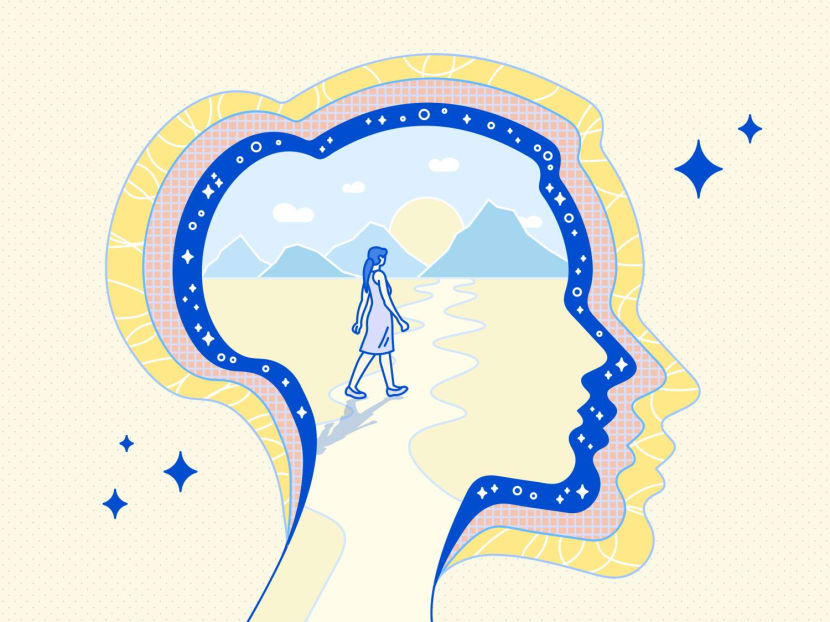Gen Zen: The value of solitude and how to ask for 'me-time' without being seen as antisocial

(Illustration: CNA/Nurjannah Suhaimi)
SINGAPORE— After a blood-pumping gym session, I look forward to the short drive home when once I have parked the car, I can sit in near-deafening silence in there and scroll through my phone for a good 15 minutes.
After I finally emerge from the car, I feel rejuvenated and refreshed, even more so than the workout sometimes.
Still, I was worried about whether I was isolating myself too much. Or worse, unintentionally hurting the feelings of those around me by needing to be by myself.
After all, having emerged from a period of enforced social isolation due to the Covid-19 pandemic, I had found myself questioning whether my preference for solitude was merely a continuation of that isolation.
I was concerned that by deliberately avoiding social interactions, I might inadvertently foster a sense of loneliness despite my intention to seek peaceful, solitary moments.
To see if some of these fears were valid, I spoke to some mental health experts who assured me that there are inherent benefits to seeking time alone and how to balance wanting solitude and being around people.
SOLITUDE VS LONELINESS
When it comes to solitude, it can be easy to conflate it with loneliness, given how their traits often overlap. Both involve time spent alone and can evoke isolation, making it easy to mistake one for the other.
Mr Andreas Oehler, psychotherapist at Range Counselling Services, said that one of the most significant distinctions between solitude and loneliness is that one is voluntary whereas the other is involuntary.
He said that solitude is often a voluntary choice to “separate oneself from outside distractions and social interactions to engage in activities to reduce stress and increase creativity”.
“Loneliness, on the other hand, tends to be involuntary,”
Agreeing, Ms Kirsty Png, a counselling psychologist from Annabelle Psychology, said that solitude is often “intentional and purposeful”.
“Loneliness is an unpleasant feeling of disconnect and usually involuntary. Such social withdrawals are often associated with anxiety, depression and adverse health effects,” she added.
This was especially pertinent when comparing the action of seeking solitude to the forced isolation of the pandemic.
Mr Oehler said that with the enforced lockdown, solitude became a semi-involuntary action, and coupled with social distancing laws in place, there were fewer opportunities for social interaction to balance solitude, which can and did lead to negative mental health repercussions.
Agreeing, Ms Png said that there has been research that indicates that solitude, where you are not physically with another person, is distinct from loneliness, where you feel alienated from others.
“The pandemic emphasised or, at the very least, reminded us of the importance of maintaining social connections but also finding a balance between solitude and social interaction,” she added.
“Differentiating solitude from loneliness is important as it allows us to recognise when one is in a state of mental wellness versus an indication of the need for social support.”
WHY SEEKING SOLITUDE CAN MAKE YOU BETTER FOR OTHERS
Besides seeking refuge in the car, other moments where I find time to be alone are the quiet mornings or even walks around the block after a good meal.
Indeed, during those times, a sense of calm seems to wash over me and the stresses of the workday seem to melt away.
Mr Oehler said that solitude allows one to reduce stress levels, increase creativity and problem-solving faculties, and increase autonomy and self-regulation.
He added that choosing to immerse oneself in enjoyable activities and taking a break from social interactions can significantly reduce stress levels.
“Additionally, actively deciding to embrace solitude from time to time increases one's sense of autonomy.
“Solitude allows one to engage in self-regulation and self-reflection, which allows one to actively process one's thoughts and emotions, which then leads to greater levels of emotional regulation and autonomy.”
Having time alone also promotes creativity, Ms Png suggested.
It allows one to fully immerse in activities without external stressors, leading to perspective-taking and decision-making that are done without pressure.
“Solitude also engages the brain’s default mode network, boosting self-reflection and memory consolidation,” she said.
As with most practices, there can be too much of a good thing.
“While solitude has benefits, balancing solitude with social interactions is equally important,” Ms Png emphasised.
“This is to prevent excessive isolation leading to social withdrawal and prolonged loneliness.”
Mr Oehler also said that seeking solitude has to be coupled with meaningful social interactions — to help reduce the negative aspects of increased solitude.
HOW CAN WE ASK TO BE ALONE?
Of course, the person who wants to have some alone-time can sometimes be misconstrued as being aloof or antisocial.
One incident that highlights this was when I chose to have my meal alone in a separate room, away from my parents, who were eating in the dining room.
Despite my intention to simply enjoy some quiet time, my decision was perceived as a deliberate attempt to distance myself rather than a personal need for solitude.
“It is all about striking a balance and warmly communicating with others why you need to engage in solitude from time to time while still positively engaging socially,” Mr Oehler said.
This can be done by first establishing our boundaries and then communicating our needs to others.
It is also important to spell out the time and duration of this "me-time".
“When expressing the need for solitude, it is paramount to highlight the benefits and need for personal solitude in a manner that other people can understand,” Mr Oehler advised.
“It is important to communicate that a need for personal time is healthy and not a reflection of anyone’s worth or the quality of the relationship,” Ms Png said.








